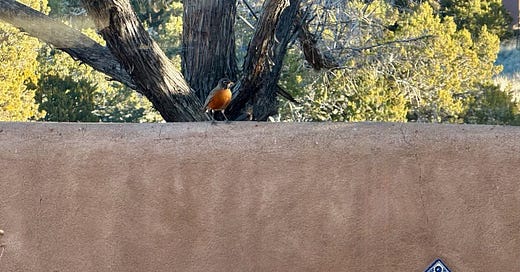after the wind robins gather, drinking, squabbling chuckling in still air
Yesterday, the bird bath sported whitecaps and birds were scarce, hunkered down in whatever shelter they could find. Today both air and bird bath are mirror-still and birds are out by the dozens. I wonder if they are as relieved as I am that the crashing waves of wind have washed on?
Hello Friends! It’s Wednesday and time to exercise our gratitude muscles. Practicing gratitude lifts our spirits in difficult times. Just the exercise of noting something we are grateful for improves our health—physical, mental and emotional—and also allows us to spread kindness to others, which has a ripple effect through the world. And this world can surely use more kindness!
My gratitude is simple this morning: the winds that howled all day yesterday and into the night have blown themselves east, and the high desert where I live is sunny and still. The calm is very welcome, even if it does come with cold—this morning’s low of 26 degrees F was almost 20 degrees colder than yesterday’s “low” of 44 degrees.
Sadly, the storm winds didn’t bring us any moisture. After 24 hours of being blasted by winds of up to 60 miles per hour, the landscape is as parched as if by a giant hair-dryer. I long for a restorative blanket of wet snow.
Winds like these—warm and dry, with temperatures 10 to 20 degrees F warmer than normal and relative humidities as low as the single digits—are hard on us physiologically, as the late British naturalist Lyall Watson explains in his fascinating book, Heaven’s Breath: A Natural History of the Wind, long out of print but reissued a few years ago by the New York Review of Books.
Whether the wind is the Scirocco of North Africa, the Föhn of the Alps, Southern California’s Santa Ana, or the Chinook winds of the Rocky Mountain Front, the effects of these warm and dry winds are extremely stressful, as Watson writes: “plants wilt, cattle go off their feed and people become disgruntled and surly.”
In humans, the positive ions carried on these winds increase our production of adrenal “fight or flight” hormones and also increase serotonin to abnormal levels, which causes anxiety, insomnia, hypotension, coronary crises, migraine and psychic disturbances. Which is likely why I am exhausted today.
Watson cites studies that show sharp rises in traffic and industrial accidents during these wind events, plus increases in post-operative deaths due to heavy bleeding and increases in violent crime and murders. In fact, Watson says, the painter Van Gogh may have cut off his ear in response to a Föhn wind event.
In short, warm, dry wind events can literally be deadly. As Watson writes,
And, in the words of Raymond Chandler, “On nights like that, every booze party ends in a fight. Meek little wives feel the edge of the carving knife and study their husband’s necks. Anything can happen.”
I have to say, I appreciate Watson’s dry sense of humor and literate writing as well as the information he conveys! Watson continues,
The Santa Ana, like other ill winds, is perfectly capable of violence without human help. When it blows, there is the usual increase in ulcer perforation, embolism, thrombosis, hemorrhage, myocardial infarction and migraine—not to mention theatrical failures, lower industrial production and loss of milk in cows. All these disorders are the result of tension, the product of an atmosphere heavy with menace and imminent catastrophe. Of dry air so filled with static electricity that even a handshake becomes shocking.
It is in such air that unnatural charges accumulate—and it seems to be these that have the most negative effect.
So if you are cranky and exhausted after a day of warm and dry winds, you are not alone. Nor are you imagining things.
Join me in being grateful for the blessed stillness after the wind passes and our systems begin to settle again. Grateful to find ourselves still here, still breathing and happy to be alive.
What are you grateful for today? Hit the comment button below and let us know!





Sitting on a balcony, gazing through thick, rain soaked air. The mountains have disappeared in dense clouds. Rain plays a soft, steady percussion. Waves rise white from the grey at the head of the bay. My lungs savor the moisture. The greens dotted with purples and reds expand this desert rat's view of life on our planet. Nene squak, flying like Canadian Geese. Donning raincoat and water shoes, I exit this dry shelter. Grateful my legs still walk me.
Hi Susan! I smiled as I read about the whitecaps on your birdbath. A fine mental image. As you began with passages of Lyall Watson’s “Heaven’s Breath” it seemed my glasses were suddenly cleared of debris! The revelation of his conclusions and findings hit like a carefully thrown dart to my temple! As if a number of loose ends had become tied together. Yesterday wind suddenly whipped up, coming in off the Gulf of Mexico. Not single digit RH, yet carrying an unsettling feeling. My dog seemed startled, and I thought “tornado alert.” 25-35 mph my estimate. Gone as quickly as they came. My night’s sleep was shallow, fidgety. On rising I had a quick adjustment of plans to perform and I couldn’t seem to get my bearings. Unfocused. Not a firm grasp on how exactly to compensate?
Not Watson to the letter. And I appreciate your passing along your observations and experiences to other practitioners of Terraphillia. Grateful.